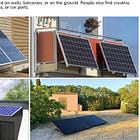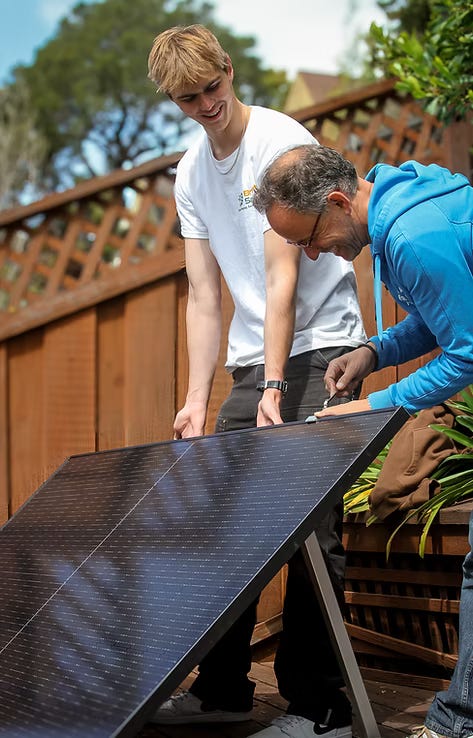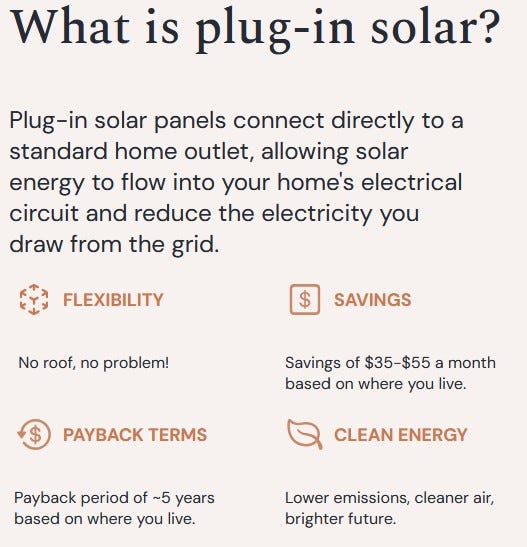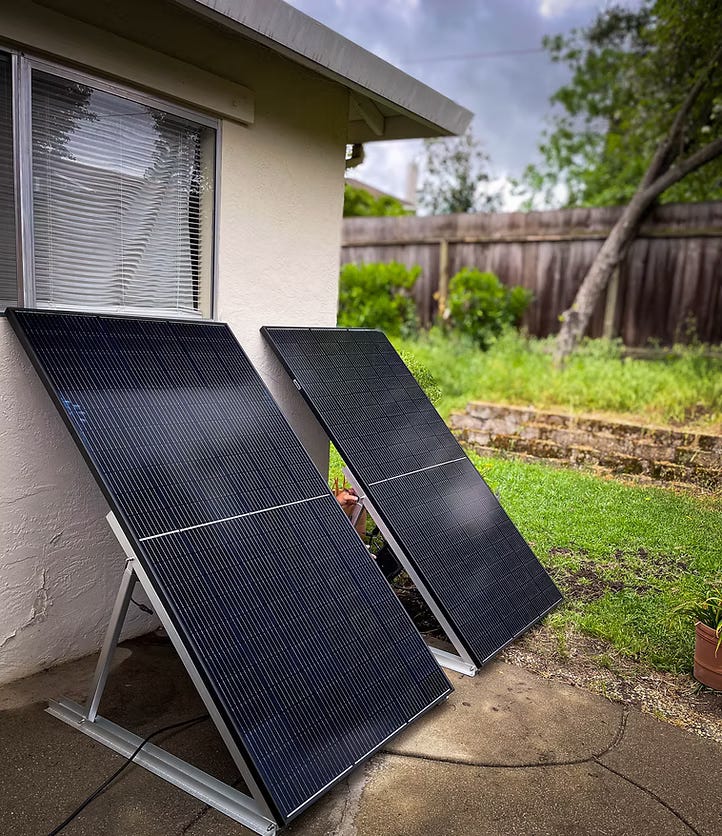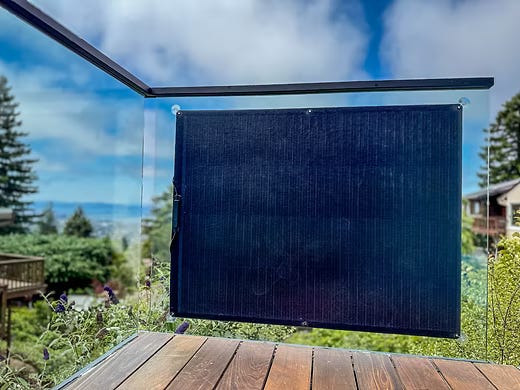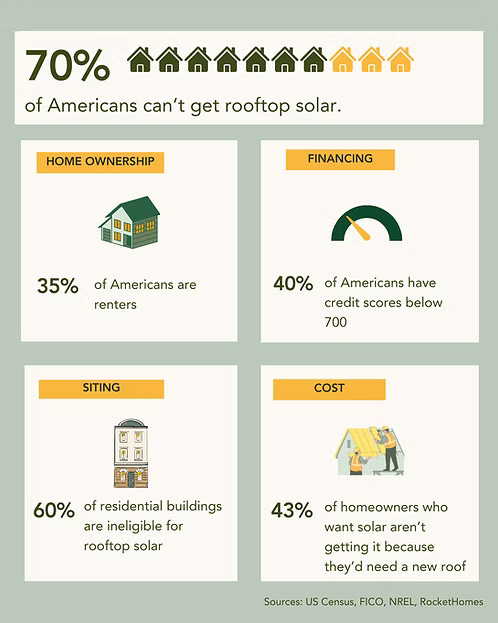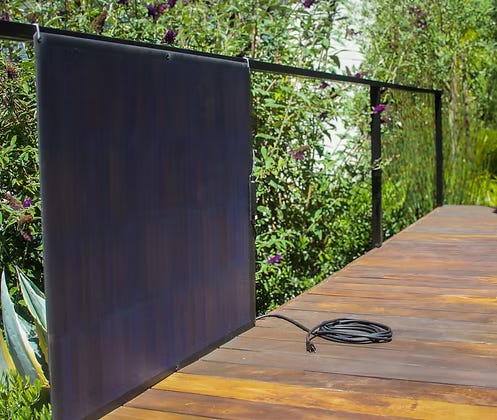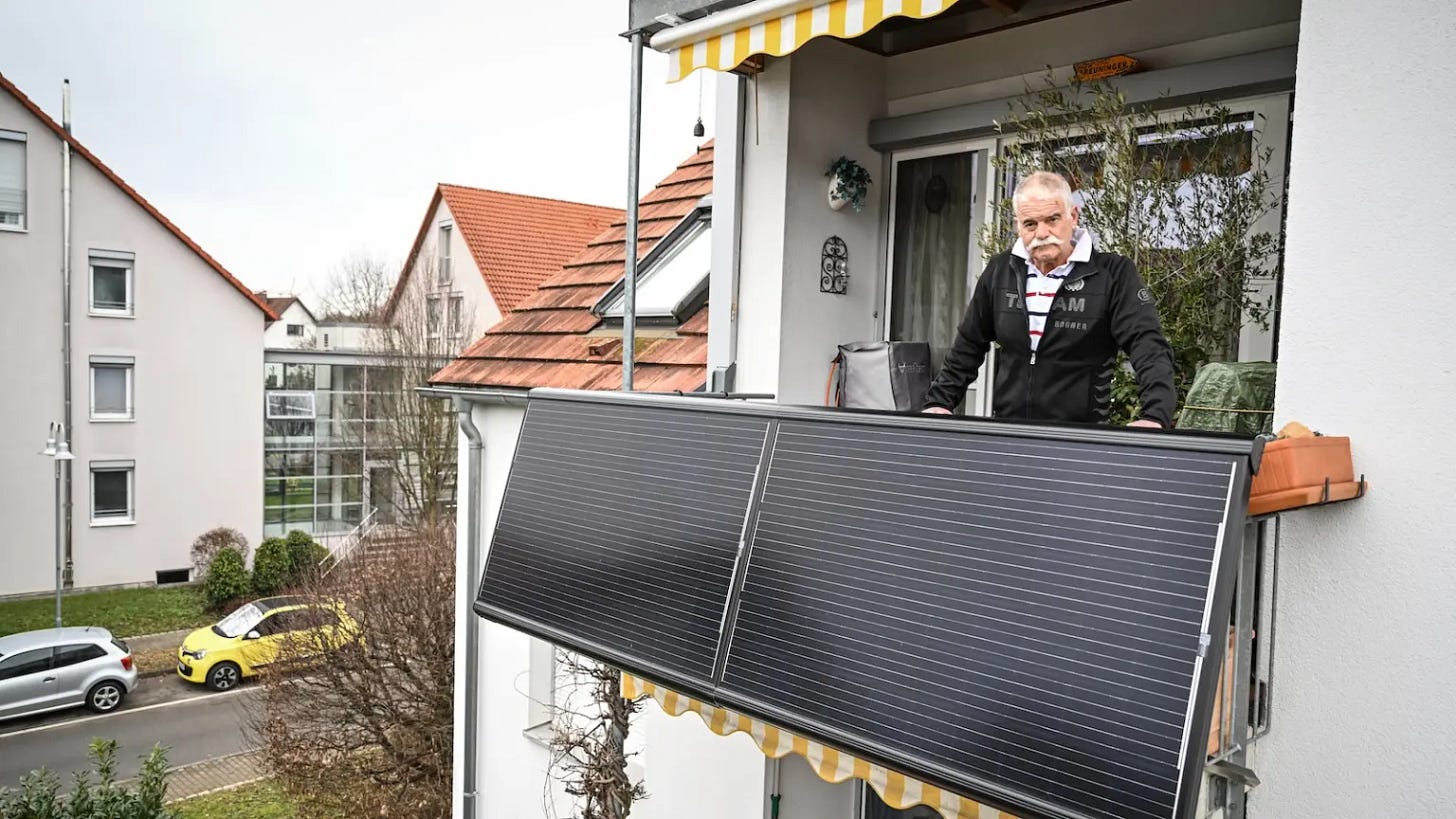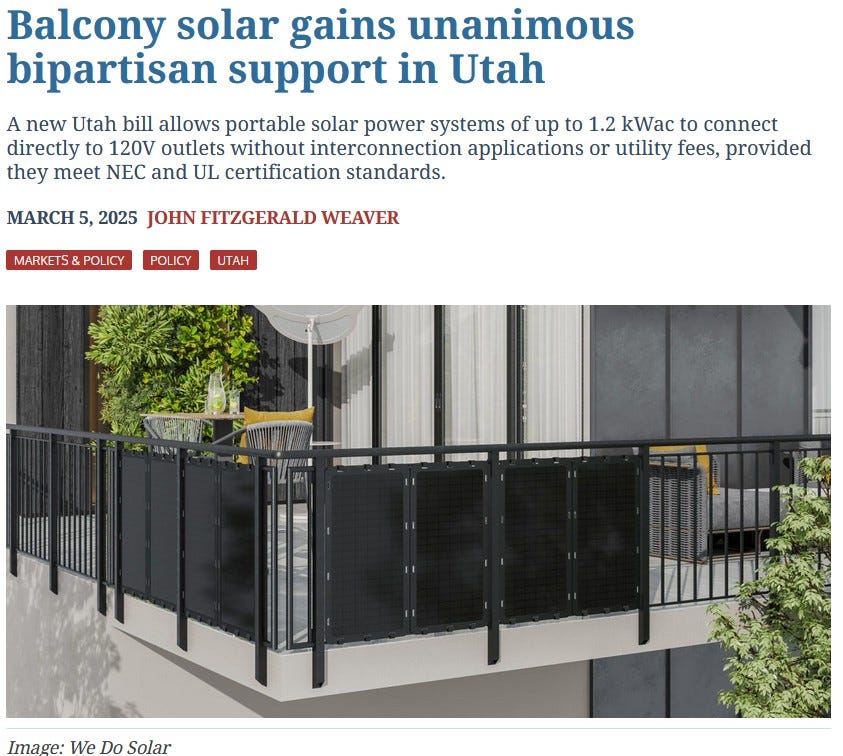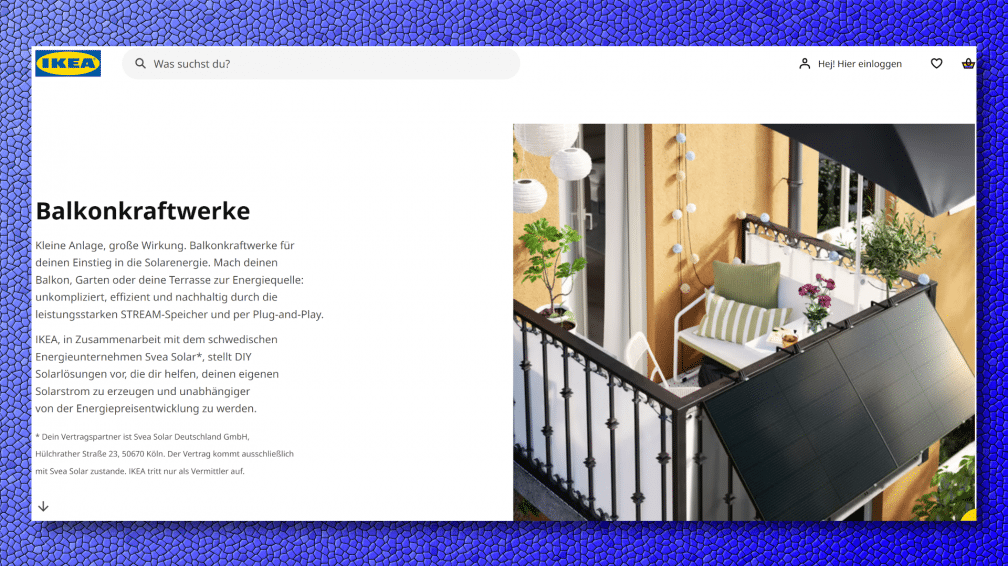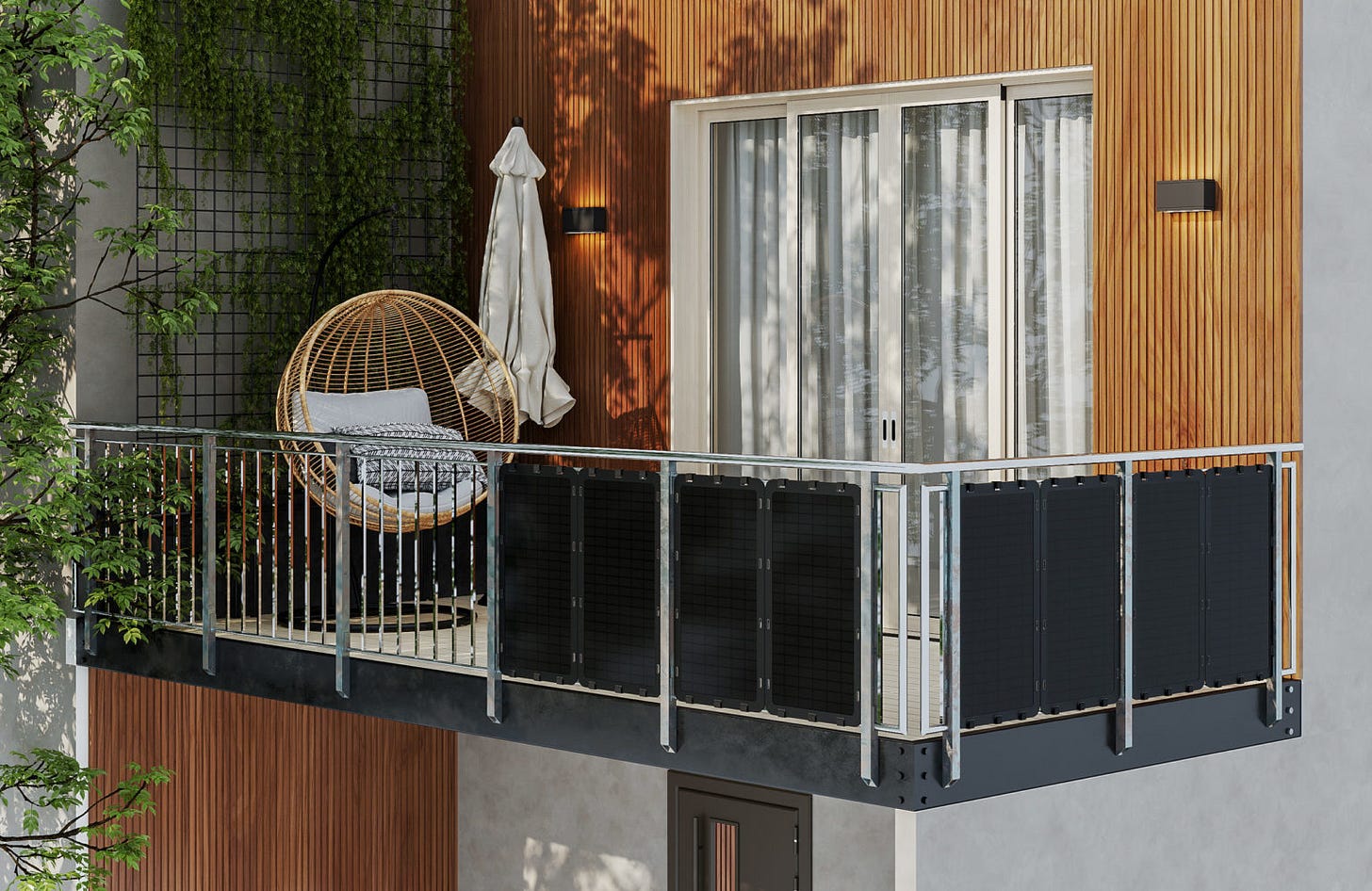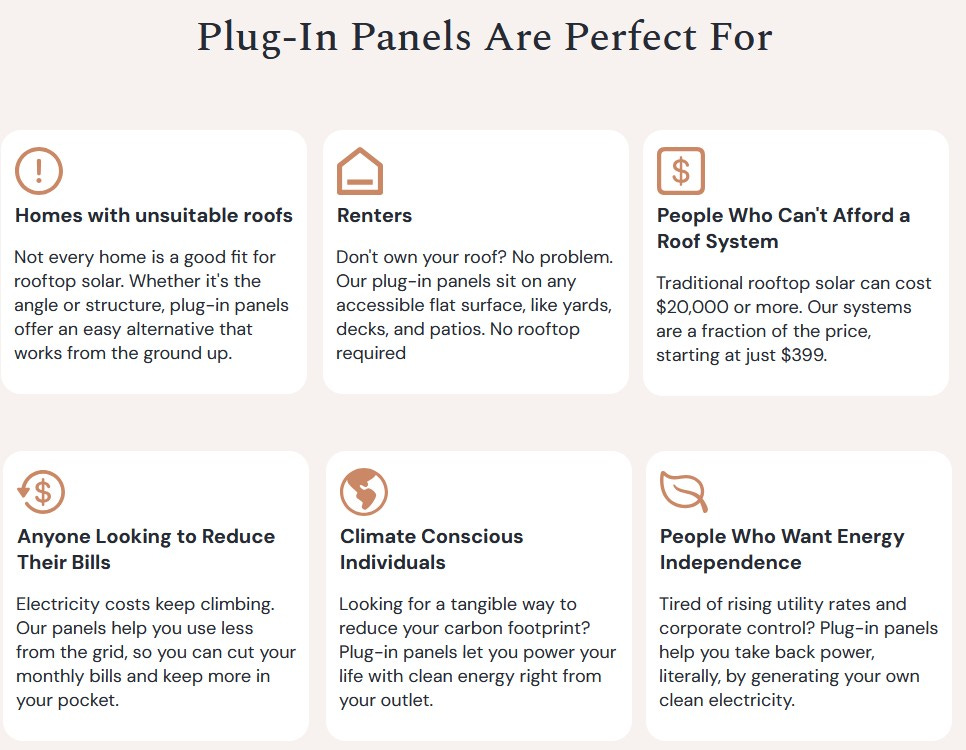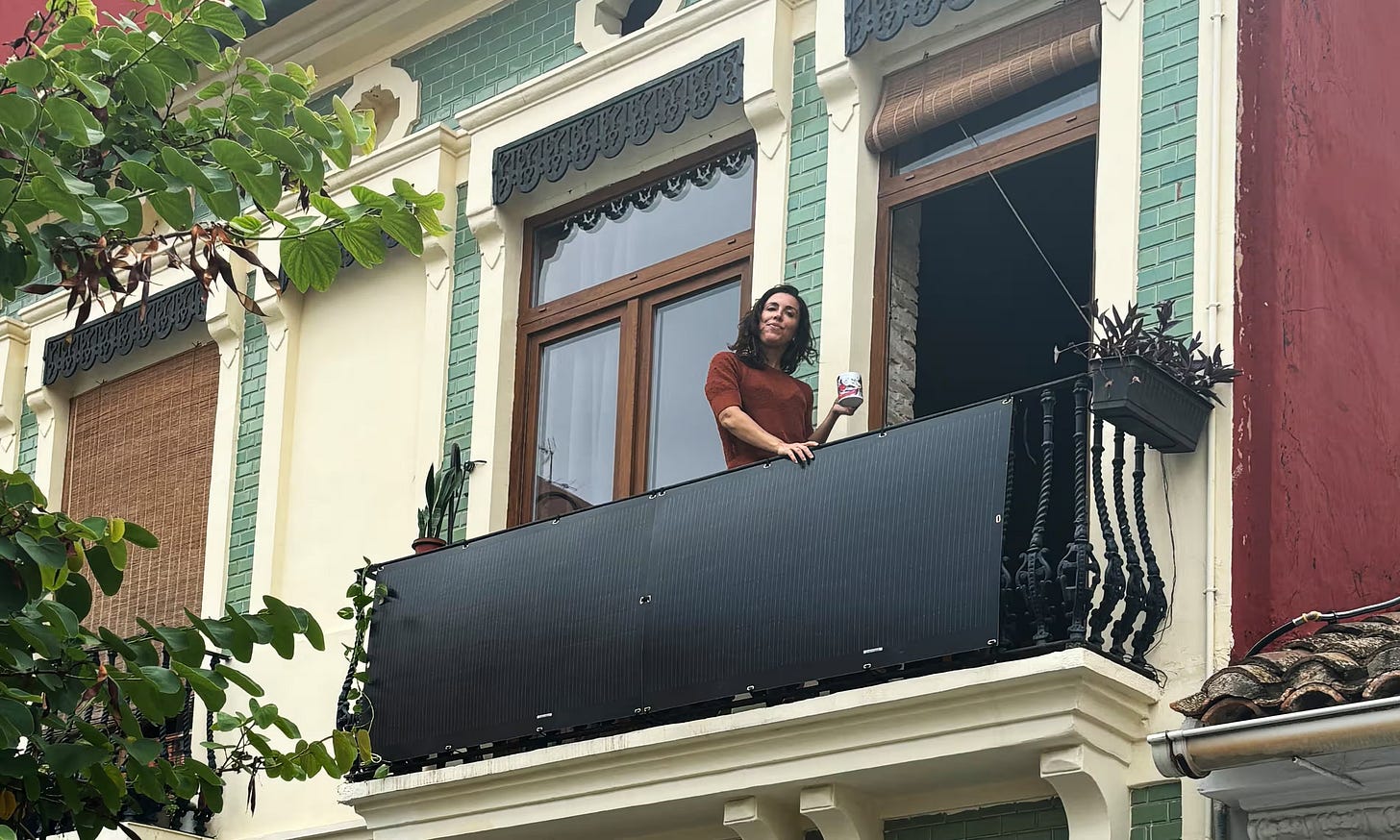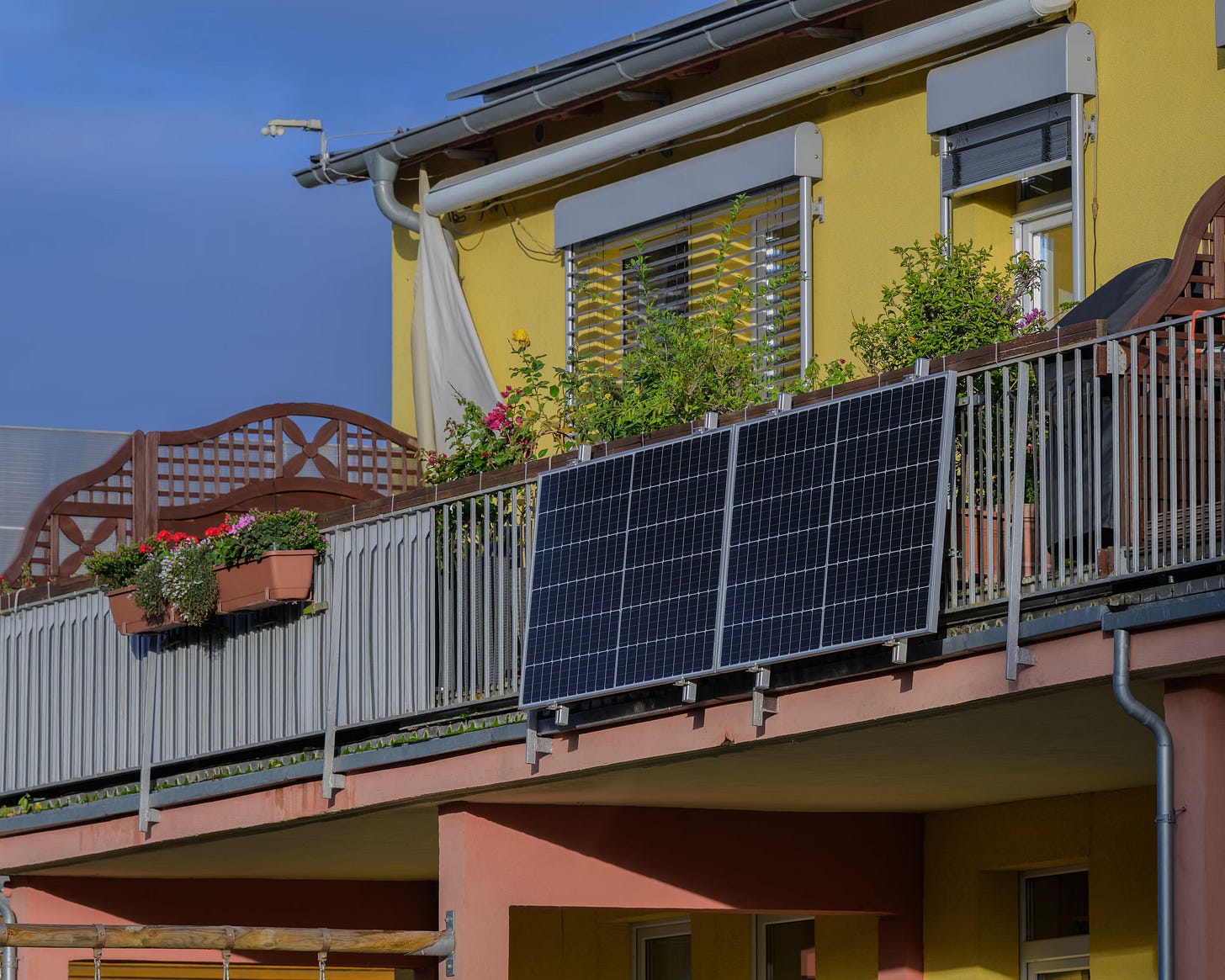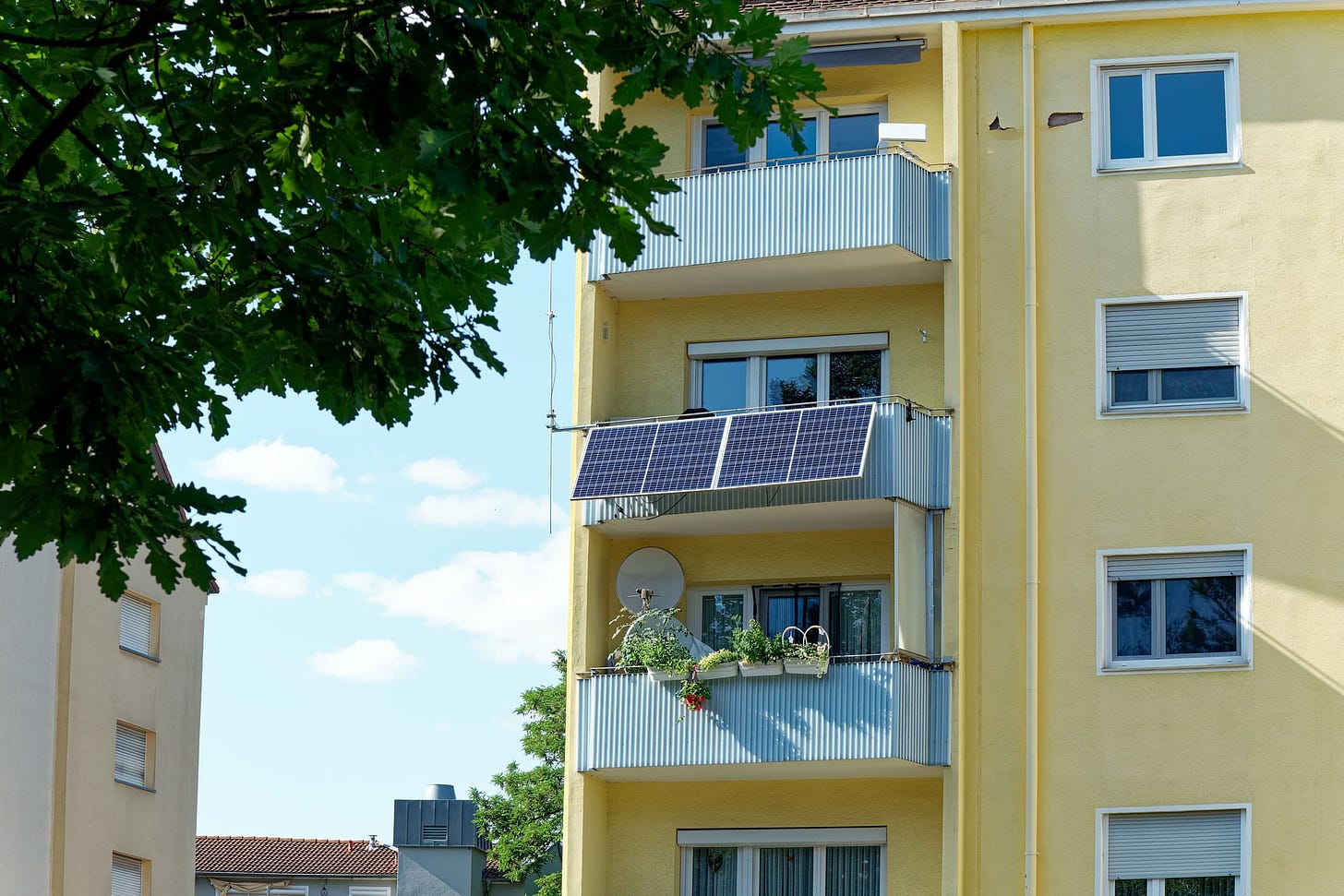Interview with Cora Stryker on Bright Saver's Balcony Solar Progress!
Fighting to bring clean energy abundance to America.
Cora Stryker is a social entrepreneur and the cofounder of Bright Saver, a brand-new climate action nonprofit working to accelerate the adoption of ultra-simple plug-in solar in America. This newsletter previously published an interview with Bright Saver in March 2025. In this follow-up, we learned that interview had a substantial impact!
In the interview below, this writer’s questions and comments are in bold, Ms. Stryker’s words are in regular text, and extra clarification (links, etc) added after the interview are in bold italics or footnotes.
To be 100% clear, this newsletter is not getting paid by or receiving any benefits from Bright Saver — this is just a REALLY exciting new idea to rapidly scale up solar in America. Let’s make it happen!
What’s been happening with Bright Saver since our first interview in March 2025?
Before you interviewed us [the first time], I was trying to spread the word at farmers’ markets. Since, we’ve seen an incredible acceleration. Your article about us was in climate newsletters, required reading for college courses, syndicated so many places. I’m deeply grateful to you. I don’t think it’s any secret in our organization that you interviewing us was the beginning of great things, and you can quote me on this!
Wow, this is amazing! Thank you so much. This is exactly what I'm hoping to do with my writing and my platform. That's exactly why I write, in the hope of doing exactly what you just described me doing. Taking good people who have a great idea and telling more people about it so it starts accelerating and gets that momentum.
You’re doing it! And your enthusiasm from the very beginning, right? I just think that you instantly knew that it was a good story and also an idea worth spreading. You were the start of the snowball.
I am so happy with that. I feel honored to be able to break this story. I don't know if people still say this in the internet reporting age, but this was a scoop! This was a really cool special thing that I got to write about. So thank you for all the cool work you guys are doing!
Well, it's mutual, Sam. We're excited! It hasn't been without its bumps and all that, but in terms of getting our story out there, that's been powerful. When we talk about this, people instantly respond to the idea. People are excited about this. It's almost like the power of an idea comes first.
Balcony solar, it's like the moon landing or something. It's something people so deeply want to be true that they will work really hard to make it happen. It's a vision, a direction to point towards.
You want that world, which Germany and so many other places already have, where you can just take something home from IKEA and plug it in and it gives power to your house.
Yeah, exactly right. I'm hopeful for the power of story working in our favor for passing legislation in other states. I mean, there are so many different ways to tell this story across the political spectrum, right? I think that hugely works in our favor. And I think in addition, that's a story that big news wants to cover.
A bipartisan little moment of hope, yeah.
Yes, exactly. This unifying thing in a world where there aren't many unifying topics in climate, at least in this country.
So, our last interview was in March, quite a while ago now, and at that time you were at like this do-or die place where you were like, “Okay, we have a hundred plug-in solar kits. We're like two and a half months old. We really want to sell these and use this as a proof of concept to see if we can survive for another two and a half months.”
Operationally, what else has changed since then, from that state of “people with a hundred plug-in solar kits and a dream?”
Quite a bit! One of the things I love about my two co-founders is that we move together at lightning speed.
Since I talked to you in March, we have really diversified how we think about our mission. We still have the same vision, which I know you share, which is that here's a technology where if we could adapt it to the North American market, if we can prove the market, if we could get manufacturers in the game, this thing would take off on its own.
People want this. That's something that we have confirmed. It's almost like there's this pent-up hunger among Americans for solar that is not rooftop solar, that is more affordable, that is smaller, that can be mounted all kinds of places, that renters can get.
And so we are thinking about what we're doing in a much more broad way. We started really focused on that proof of concept, finding a hundred people who will be our early adopters to test it out.
Now, we're backing up a bit and we understand that this goes way beyond a hundred people in the Bay Area. We want to give every single person in North America the option to produce their own energy from the sun.
That's a big vision, and there are a lot of ways we get there. There are some barriers we need to remove, break through, tackle, whatever metaphor you want to use.
We are an interesting nonprofit model, which is uncommon in the nonprofit world, but it's something that's actually quite familiar to me. I cut my teeth in nonprofit work, working for a nonprofit called Samasource, run by the late, great Leila Janah. She passed away at 37 from a one-in-a-million cancer. I think about her all the time.
She had this brilliant idea where she looked at outsourcing. She said to herself, why are these decent jobs going to fairly educated, fairly privileged people in India, in East Africa? We can train people living in much more desperate circumstances to do this work. At the time, it was image tagging primarily for AI applications. We can train them, and it will be transformative to give digital work to even one person living in Kibera Slum outside Nairobi. One person can lift up their entire family, grandparents, kids, middle-aged folks.
And she did it. It was a really interesting model in that we had this strong earned revenue stream from Apple, from Google. We had big clients, but we had a social mission.
To me, what we're doing with Bright Saver is very familiar in that sense. We do have this earned revenue stream from customers. We are selling this stuff. We think that's part of how we achieve that vision. We have to have these things in the wild. We have to show that they work, that people like them, that there's a demand. And there is!
And there are also parts of what we need to do that are more in the realm of a traditional nonprofit. Educational, spreading the idea, particularly in the political realm.
Yeah, absolutely.
When I talked to you last time, we were really focused on backyard solar, right? [Our kits were] rigid 80-pound panels, two of them. We were really focused on that, 100 of those.
We did a lot of installations in the Bay Area, and we learned that that is not the only model that can help us achieve this vision.
So we put a new product out, just to our newsletter subscribers, actually. It's a flexible panel. It's much more similar to what you'd see if you went to Munich. It's this fabric-like flexible material that you plug in and hang over a balcony. It's sort of a true balcony solar system. Now there are two models we sell, the backyard solar rigid-panel and the balcony solar flex-panel.
We put it on sale, and it's sold out in less than a week. We didn't really do any marketing, we just blasted our email list. So that was super exciting!
Things like that, they’re just getting this confirmation that people are eager, they're excited. We think this is just the tip of the iceberg. We think that there's a future for us where we do have a strong earned revenue stream. But again, we're a mission driven organization. So our goal is to take that and keep our prices as low as possible so we can reach people in the millions in North America.
That is absolutely brilliant!
I saw on your website an infographic that was really, really good, discussing how 70% of Americans can't get rooftop solar. Can you break that down? I hadn't seen that stat anywhere before.
It's from a number of sources. We actually just finished a draft of our white paper. It turned out that we have someone on our team who I hired for social media, and turns out to be a former energy analyst who used to work at the U.S. Department of Energy. So she and a small team of us worked for quite a while on this white paper. And yeah, everything in there is from the NREL, EIA, everything is primary sources. We thought really long and hard about that 70%, and we feel pretty good about the breakdown, the calculation, the sources.
A formal energy analyst who used to work at the DOE, I'm guessing they got fired in the Trump purges, right?
No, this was a long time ago. This was maybe 10 years ago. Although it’s interesting that you mentioned that, because I talked to someone yesterday who has one of these flex panels, these balcony solar panels, and we asked him if he would publicly talk about it.
He said he wants to be anonymous because he works in the federal government.
Wow.
There's so much hostility to solar right now. He said he doesn't want to get caught in the crosshairs, even though he doesn't even work on energy. I guess I shouldn't have been surprised, but he's really afraid of getting fired if he publicly talks about how much he likes these flex panels.
Well, the U.S. is in a bad, crazy place.
The nice thing about small-scale solar is that with the Pakistan example, there's demonstrated evidence that it can spread in a place where the state is very dysfunctional. And, you know, we're more similar to Pakistan in the U.S. now than we were when I talked to you in March.
I think that's actually one of the most exciting things about this. Many of us who care about climate sat down and cried after the reconciliation bill passed, including myself.
With models like the one that we are working hard on, just as you said, people can take power into their own hands. People can drive this movement without needing to lobby Congress, for instance.
Now, we do want people to talk to their legislators on a couple fronts. In Germany, [balcony solar] was very people driven. It was a DIY movement for 10 years. Then it was this series of legislative efforts, after spikes in energy prices from the war in Ukraine. But the trend continued in the same direction, which was people wanting it for themselves, originally with no subsidies, and just wanting lower energy prices, wanting to do something about climate. So I think it's very empowering.
Having been in the more traditional nonprofit climate world before I started a couple organizations, I've heard this phrase from people I deeply respect who have been working on climate for a long time. This phrase, “The market will take care of it.” And, you know, I don't think they're wrong. Solar, it's the cheapest form of energy on the planet, full stop. But I also believe strongly, and Bright Saver is a really strong example of this, that we can't be passive. We can't just sit back and watch it without us. We need to be as aggressive as we are as activists.
It is sort of a market enablement model that we have at Bright Saver, because we truly hope to put ourselves out of a job. We want to be obsolete five years from now, because we want this to be taking off without us like it is in Germany. And the question is, how how do we get to that that place?
We really believe it's a couple of things. One, it's demonstrating the market. People want this! We feel quite strongly that we are already seeing this, and we think we think the more people hear about this, the more it's a no brainer. They want it.
And we think that once we get a couple more states to pass legislation like we saw in Utah, HB 340, we think manufacturers will see that. And they'll say to themselves, they've wanted to come into the U.S. market for a long time, they just are hesitating for a number of reasons.
I don't know if we want to get into the weeds of what Utah 340 did.
Please do!
Well, we want to get the manufacturers to come here. They want to come here anyway. They're hesitating for a number of reasons. They've [passed pro-balcony solar legislation] already in Utah, but Utah's not enough. So we're working hard to pass legislation in about half a dozen other states in the next cycle.
Can you tell me those states?
We're in serious conversations with two state legislators who are telling us off the record that they're going to do this. We're going to make a big announcement soon, actually.
That's what I mean by, you know, we're an omnivorous organization in the sense that we see this problem. The problem is the same. How do we have this thing taking off without the need for subsidies, without the need for really anything other than market forces?
And it's a more complex picture than I think we realized. I mean, everything's like that, right? You think it's simple and then get deep into it.
So we're moving forward on these multiple fronts. We're working with elected officials to pass legislation. We are selling products. We're quantifying the demand. Our products are limited because legislation does not exist in every state.
Maybe that's a good place to talk about some of the details of what we're fighting for.
Absolutely! This is spectacular. Also, I wrote this Daily Dose of Climate Hope based on your work. People can go to this link, and our software will direct them to their personal state legislator with a pre-written letter telling them to support a Utah-style law about balcony solar.
Sam, you read my mind! Fantastic! Thank you. I’ll have my social team put it out.
Yeah, I built that with you guys explicitly in mind! And I'd love to do another one when you have more specific legislative details and stuff like that.
That would be incredible.
So tell me more about the Utah legislation. Tell me more about what it does, what it doesn't do, what you need it, what you need it to do.
Yeah, sure! So Utah HB 340, it's an incredible story. And actually, to me, it's a story about the power of stories.
About a year ago, there was an article in the New York Times by Melissa Eddy about how balcony solar is spreading through Europe. So that came out and a state legislator named Raymond Ward in Utah, a Republican, read that article and thought what many of us think. Like, “Hey, why isn't this here?”
So he took it upon himself, because he's an elected official, to go deep into this. We actually were part of the drafting process of this legislation. And he built this amazing coalition that seems like a miracle in this political climate. He built a coalition that passed this thing unanimously through both chambers in Utah and then was signed into law in 2025!
What it does, it's quite simple. I was talking to a legislator a couple of weeks ago, he says to me, this is a no brainer. Yeah, it's a complete no brainer. The thing to understand is that all the guidelines for solar arrays in this country were based on much larger systems. much larger rooftop systems, sometimes industrial-sized systems, and they simply are antiquated, outdated for these smaller balcony solar systems.
So what Utah HB 340 did, driven by Ray Ward, it basically created a new [legal] category of photovoltaic systems under 1200 watts.
The reason that's crucial is it sets them apart for new guidelines.
The legislation says three and a half things.
So [one] it creates this new category.
[Two] It says that this new category is exempt from interconnection agreements.
That's important because going through the process of an interconnection agreement for these small systems is onerous. It's time consuming. It really bends the cost curve so these are no longer affordable to everyday folks immediately. It's everything that if you got rooftop solar, your rooftop solar company would do for you: file the paperwork, get the inspection, all that stuff.
It's a lot for these little systems, and it really takes away from this empowerment vision of, “Hey, you can do this yourself. You can buy this at IKEA.” IKEA actually started selling these in Europe recently. Bring it home, plug it in!
We're getting kind of deep into this. In many states, you could actually get an interconnection agreement for these systems. But it would take you time, it would take you money, you'd have to draw these technical diagrams somehow. It really takes the power away from the people to install these.
So what Utah did is, they said “No, this is a new category. The traditional guidelines of rooftop solar do not apply. You are exempt from interconnection agreements and you're allowed a small amount of back feeding, and the reason this is considered safe is because we're talking about systems under 1200 watts.
So those two things together, and then a couple things the utilities asked for. The utilities are released of liability, for instance.
It's a very simple law. I mean, it's one page! There are no fiscal implications, no subsidies needed. It just defines this new category.
So in Utah, as I said, manufacturers are already there. They're already selling product — at least one is. One's not enough.
We need all the major manufacturers to come in, to see there's a market in the United States. People are hungry. They want this!
And then they'll compete against each other, prices will get lowered, ease of use will increase and a couple years from now, you really will be able to go to IKEA [in the U.S., as you already can in Germany] and buy this stuff!
I don't know if you've read the book Abundance by Ezra Klein and Derek Thompson. You guys are the Abundance Agenda! This is exactly what the book talks about. Soft costs, interconnection, permitting delays are a huge topic. It’s exactly this.
There's a vast array of low hanging fruit, stuff with zero fiscal implications, that can just make it easier to build stuff, especially the new clean stuff that we need to make America a better place.
I find this incredibly exciting! The fact that you can pass a one-page bill with zero fiscal implications and that it can potentially unleash home clean energy systems?! That's amazing. That is a no-brainer for every state in the country.
For those of us who really care about climate, I don't know about you, but I sometimes feel like Sisyphus. We fight so hard for subsidies, for the carrot, for the stick. And we really watched everything we fought for in the IRA disappear like that.
It's really exciting to me that we're riding market forces. We're actually stimulating market forces. This thing doesn't need us at a certain point. One of the reasons, I would argue, that this did pass unanimously in Utah is partly because a Republican authored it. But also, I think it appeals to so many of our values across the political spectrum. I mean, this is a deregulation bill!
Yeah, it is.
And in the environmental movement, deregulation is a dirty word, or has been for a long time. But this is low hanging fruit. This is a no brainer. And [not passing balcony solar-deregulating laws like Utah’s] it's holding us back from widespread solar adoption in really all of North America. It's just the beginning.
One of the big things that I'm trying to introduce to people is that right now deregulation is one of the best strategies to fight the climate crisis, in specific key areas. Existing industries have had time to build carve-outs and loopholes and just can afford lots of lawyers. Regulatory burdens fall disproportionately on the new stuff we need to be building, like clean energy, new climate-smart forms of agriculture, so many other fields.
There's ridiculous amounts of regulatory red tape around almost everything that you need to do to fight climate change, from building a solar farm to testing ocean alkalinity enhancement climate repair techniques. But there's tons and tons of existing categorical exclusions and industry carve-outs if you want to drill an oil well or something like that, and more and more every day under Trump.
I agree with you. There are powers that be have fingers on the scale in the direction of the past, in the direction of, honestly, illogic.
I mean, we could take the technology that exists today and we could solve climate like that. We really could. The technology exists. The scientists have been doing their jobs. Why is the market not taking off? Well, it is in some ways. But why is it stymied? Why isn't it happening faster? It's these things that we're talking about.
You know, I really believe that this can be the role of activists and nonprofits, to really fight against the powers that have their fingers on the scales to make markets fail, to make clean energy markets behave in illogical ways.
Yeah! People are like, “oh no, deregulation, sounds free-market, sounds vaguely like a tool of corporate power.” But the situation we have now on U.S. energy is incumbent corporations hijacking the market using regulations to give themselves windfall profits by preventing cheaper competition technologies from emerging. This isn't free market, this is like a planned economy in reverse, actively planning for bad things. Actively trying to sort of bolster up the falling-apart economic case for fossil fuels by any means necessary and imposing red tape on renewables!
The American government and fossil fuel industry right now has a very Soviet vibe. Just announce that you’ll someday have huge increases in output of more stuff that people don't want and prevent them getting the things they do want.
Sorry, I'm just ranting!
No, you're not. I mean, this is what we face.
Like you said, balcony solar works across the political spectrum. You can put this as incumbent big business is doing regulatory capture to crush scrappy startup competitors and impede the power of the free market to improve Americans' lives. You could pitch this as a libertarian think tank proposal, and it still works. It works under almost any value system. You can view it as a climate thing, an equity thing, a market thing. It's all of those!
Yeah, exactly. It is all of those. That gets me excited! And, you know, when I see people's eyes light up, it's not for the same reason all the time.
I do think it's an equity thing for sure. There are people right now in some of the hotter parts of North America who are not turning their air conditioning on because their energy bills are so high. That's a public health crisis. That's life-threatening in some cases.
I think that one of the things that these balcony solar systems can do is they can break that idea that that energy costs keep rising and we have to just keep paying our bills and we have no power. No pun intended! One of the things I'm so excited about is that is that is energy independence! If you combine this with a battery, of course, and if you read our white paper you'll see that we really recommend to pair them with batteries.
You have these blackouts and brownouts. The grid is a mess. Balcony solar is energy resilience, it's equity, it's libertarian get-regulations-out of-the-market. It's climate, of course.
Is this rare?
Maybe it's not.
Maybe it's not rare that we can have these series of no-brainer solutions adding up really get us, maybe not all the way to where we want to be, but a good distance toward where we want to be.
What else would you like to add? What else would you like to share with people?
Oh, and one other question I had. Where does the flexible solar panel come from?
The pilot that we just sold out of was manufactured in China. We are getting a couple other models that we're going to be testing out. One is made in Turkey. We're kind of excited about that. We'd love to be a part of a different...I'm not anti-China here, but it would be neat to not have to be in that economic relationship with China for this.
That's something that we are very cognizant of. Where does this come from? How is it manufactured? What were the emissions that went into producing this.
We have quite a wait list. The longer the wait list, the easier we can raise money, because, as we were talking about revenue streams in the beginning, we're mission-driven.
We don't want to have to take investment. We don't want to be beholden to forces that want us to raise prices, increase profit margins, because we really do imagine this world in which anyone can have this, at scale.
So, if you get on the wait list, great! If you get on the newsletter, great! We just are looking for folks to voice their support for what we're trying to do. I'm really excited about the action you already put out there.
I think helping you guys might end up being the biggest contribution to the fight against climate change I've done this year. I'm really excited about this.
Oh, we're super excited, too! We only achieve that vision at scale. To get it, to achieve scale, we need people to know about this. We need people to support it. Because yeah, we hope to put ourselves out of jobs. We really hope that this is one of those no-brainer things that once it's done, it's done. It takes off without us and we move on to the next climate challenge.
This is brilliant. And this is just fundamentally how society should work, how progress should work. It’s like the dawn of the consumer appliance age in the 30s, 40s and 50s when people suddenly had all these labor-saving devices in their homes. People should be able to buy a device that gives them clean energy! Especially given how much work the world has put into developing clean energy. This is just a huge democratization of the fruits of the labor that the world's scientists and engineers have spent on this for the last several decades.
That's right. That's our vision. That really is what we're going for.
You know, it'll go in fits and starts. There's the early adopter crowd.
Then, you know, I really do envision a world in which you walk through, let's say Richmond, California, which is near me and that is a place where people have trouble making ends meet a lot of the time. If you walk through a neighborhood like that, five years from now, you see your neighbors have these panels, and you talk to them, and they say “Hey, it only cost a few hundred dollars and it paid for itself in energy bill savings in three years.”
Once it becomes ubiquitous, you hit this tipping point and you're not just looking at the early adopter crowd, you're looking at every community we have.
Part of our vision is that even then there will be folks who can't fork over the $300, $400, which is what we're talking about in Europe. And we, Bright Saver, would like to be part of closing that gap. We started this because we wanted low income and low to middle income communities specifically to have this option.
So we're determined to still get there and we are on our way. Thanks to your readers, many of whom have become early adopters and early champions. We can't get to that vision, where it's ubiquitous and you walk through neighborhoods and you see it everywhere and you talk to your neighbors, we can't get there without getting through this sort of adolescence of early adoption.
And state legislation.
And state legislation. We definitely need that.
And about your white paper?
What I'll say about the white paper is that it's in the hands of a really small group of peer reviewers, and they're taking a look at it. So far, the early feedback is fantastic. But there are a few points of feedback we want to incorporate before we release it publicly. We worked really hard on it and took our time and we were really hard on ourselves.
Your work on balcony solar is absolutely amazing. This is a meaningful way to make progress on climate action, even when the federal government is actively hostile to clean energy.
Yeah, that's exactly right! We don't have to sit and be depressed, although part of me is sitting and being depressed. We can still work on stuff at the state level, as you know, but also on these issues that can go far beyond states.
Like, for instance, Utah is one state. But it has started this chain reaction that we believe is going to spread through a critical mass of states in the next year.
And it goes far beyond the state borders, right?
Even if we're talking a blue state, a red state, a purple state, it doesn't really matter. As soon as the manufacturers see the potential, they come in and then at a certain point, the market takes care of it. But we're not there yet.
We have to make this sort of injection of capital and interest and enthusiasm that the government should be doing, right?
The government should be subsidizing technology like this. They're not. So we have to do it.
Thank you so much. It has been such a pleasure interviewing you. I'm super psyched!



